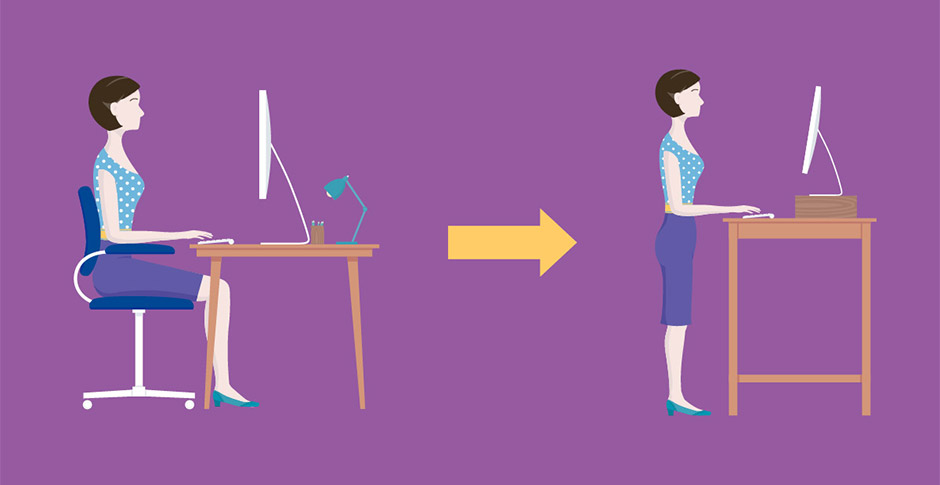Standing up at work must rise
While the image of the bronzed, beach-going Aussie is still firmly part of our national identity, our lifestyles have changed drastically over the past few decades – resulting in Australians sitting more than ever.
- Nine hours a day. The way we now work, communicate and travel has significantly increased the amount of time we spend being sedentary, and has potentially disastrous effects on our bodies. Did you know Australians are now sitting for a shocking average of around nine hours each and every day? Nine hours may sound like a lot, but consider how long you sit for at work. How much time do you spend at your desk, or in meetings? How many hours do you spend sitting in the car, or on the train to get to work? And at the end of a long day, how long do you spend sitting on the couch to relax and unwind in front of the TV, or beside the barbecue with a couple of beers? You may be surprised at how quickly it adds up.
- Your body is designed to move. Paddy Dempsey, a researcher in Baker IDI’s Physical Activity and Behavioural Epidemiology Laboratory, says our biological systems function optimally when we are regularly physically active, and that the prolonged periods of sitting that now characterise much of our day-to-day lives – especially our working lives – are missed opportunities for healthy movement.
“Muscles – especially the big ones that move us and hold us up when standing – burn fewer calories and contract less in their immobilized state. Blood flows sluggishly around our body and to our brain and blood pressure rises, ultimately increasing the risk of heart attacks and strokes.”
Dempsey also says prolonged sitting changes our ability to deal with the food we eat, which means blood sugar levels spike to abnormally high levels, wreaking havoc with our cells, nerves and organs.
“Insulin – a hormone that helps lower blood sugar – is also raised abnormally and becomes less effective at doing its job, putting pressure on the pancreas and increasing the risk of developing type 2 diabetes.”
- You’re not doomed to sit. The negative effects of all that sitting are pretty grim, but the good news is, we don’t have to do much to offset these adverse effects.
“It’s been shown, in both our laboratory and others, that when people interrupt their sitting time every 20-30 minutes with brief bouts of standing, walking, or even simple stretching or body-weight activities, there are significant improvements in all the bodily functions,” says Dempsey. “Our participants also report feeling less fatigued and more mentally alert, and studies have shown that cognitive abilities are largely unaffected while standing.”
His advice to people is simple: stand up, sit less, move more, and more often.
“A reasonable suggestion for the office is to aim to accumulate at least two hours each day of standing and light activity such as walking to move larger muscles, and to work up towards four hours each day.
- Top tips to get moving at work. Dempsey says it’s important to remember that sitting is still okay – after all, we all need to rest sometimes. “The problem is we are becoming addicted to our chairs – sit-aholics so to speak!” His top 10 tips for being more active at work are:
1. Avoid long periods (more than 20-30 minutes) of continuous unbroken sitting
2. Stand up on public transport
3. Park near the back of the parking lot
4. Choose more active ways to socialise with colleagues (swap the cafe for a walk)
5. Take the stairs
6. Have standing and walking meetings (they usually end faster)
7. Stand up and pace while on the phone
8. Drink more water to increase your toilet breaks
9. Talk to colleagues rather than emailing
10. Set up your office desk/office in a way that is conducive to more movement
For more information, check out Baker IDI’s Rise and Recharge campaign, aiming to make employees “chair-aware” of the health implications of sitting down.
